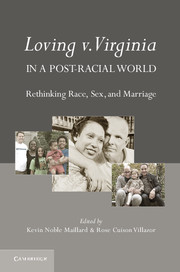Book contents
- Frontmatter
- Contents
- About the Contributors
- Acknowledgments
- Foreword
- Introduction Loving v. Virginia in a Post-Racial World
- Part One Explaining Loving v. Virginia
- Part Two Historical Antecedents to Loving
- Part Three Loving and Interracial Relationships: Contemporary Challenges
- 6 The Multiracial Epiphany, or How to Erase an Interracial Past
- 7 Love at the Margins
- 8 The Crime of Loving
- 9 What’s Loving Got to Do with It?
- 10 Fear of a “Brown” Planet
- Part Four Considering the Limits of Loving
- Part Five Loving Outside the U.S. Borders
- Part Six Loving and Beyond: Marriage, Intimacy, and Diverse Relationships
- Permission Granted
- Index
- References
7 - Love at the Margins
The Racialization of Sex and the Sexualization of Race
Published online by Cambridge University Press: 05 July 2012
- Frontmatter
- Contents
- About the Contributors
- Acknowledgments
- Foreword
- Introduction Loving v. Virginia in a Post-Racial World
- Part One Explaining Loving v. Virginia
- Part Two Historical Antecedents to Loving
- Part Three Loving and Interracial Relationships: Contemporary Challenges
- 6 The Multiracial Epiphany, or How to Erase an Interracial Past
- 7 Love at the Margins
- 8 The Crime of Loving
- 9 What’s Loving Got to Do with It?
- 10 Fear of a “Brown” Planet
- Part Four Considering the Limits of Loving
- Part Five Loving Outside the U.S. Borders
- Part Six Loving and Beyond: Marriage, Intimacy, and Diverse Relationships
- Permission Granted
- Index
- References
Summary
The U.S. Supreme Court holds steadfast to the theory of a color-blind America. While this may be a worthy aspiration, those of us involved in black-white interracial relationships know that color-blindness is but a legal fiction. As a black woman in a long-term relationship with a white man in America, I will analyze some of the sociopolitically and socioculturally imposed challenges faced by black-white interracial couples. While such disparate scrutiny oscillates between curiosity, fascination, and hostility, there remains a racial fixation that reveals the Supreme Court’s theory of color-blindness as wishful thinking. In this respect, interracial couples might be the proverbial canaries in the coal mine, revealing suffocating racial dynamics at work just beneath the surface.
Critical Race Theory’s narrative style exposes the ways in which the personal is political. Put another way, the intimate is deeply sociopolitically enmeshed. By exploring the ways in which my interracial relationship has been scrutinized and hypersexualized, I posit that much of the way we comprehend race in America is sexualized, and that much of the way we understand sex is racialized. As such, racism is also often sexualized. This chapter connects such racialized sexualization to its historical roots. Thus, while we have progressed a great deal since the landmark decision of the Supreme Court in Loving v. Virginia, there exists a troubling racial fixation in America that is revealed when one gazes through the lens of encounters faced by black-white interracial couples.
- Type
- Chapter
- Information
- Loving v. Virginia in a Post-Racial WorldRethinking Race, Sex, and Marriage, pp. 101 - 113Publisher: Cambridge University PressPrint publication year: 2012

